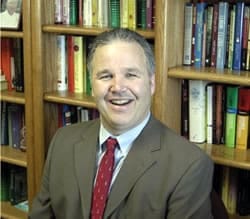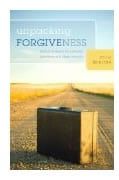Unpacking Forgiveness: An interview with Chris Brauns


I first met Chris Brauns at an annual retreat held for graduates of a D.Min. track at Gordon-Conwell. I’ve been impressed with his warmth, and I’ve enjoyed getting to know him better through his blog.
When I received Chris’s book in the mail recently, I was excited to discover that his book is everything I had hoped it would be. Unpacking Forgiveness is now my go-to book on the subject.
I recently asked Chris some questions about forgiveness, and he was kind enough to answer them. Part two of this interview will be posted tomorrow.
What made you interested in the subject of forgiveness?
The short answer is that I realized I couldn’t pastor my church unless I really understood biblical truth about forgiveness. Along with that, I think we need books on practical theology written by pastors who have one foot in the Word and the other in people’s lives. Nowhere is that need greater than in the area of forgiveness. In a fallen world, relationships get broken. We all have to unpack forgiveness.
That’s the short answer. (Skip to the next question if you like). One of my first counseling appointments as a senior pastor was with a woman, nearly old enough to be my mother, whose marriage was falling apart, or rather, had fallen apart. I don’t remember all the details, but the ones I remember were ugly. Really, really ugly. This counseling session might have been the first time I met her. She had not been coming to church.
We sat down to talk at a small round table in my study. I took had my Bible and a legal pad. I prayed and she began to tell me her story. She was polite but matter of fact—and very angry. She was not angry at me. But she was upset about what she had been through and the fact that nothing had worked to fix it. She was probably also angry at Christians who acted as though her problems could be easily fixed. Her luggage was getting really heavy. To this day, I am not sure why she even agreed to talk. Maybe it was a final goodbye wave to trying.
She told me a little about herself and then looked at me poised with my Bible and legal pad in hand. She probably thought about my wife and me with a baby and a little girl wearing dresses and white patent leather shoes. She finally said, “Look, you are just another young pastor.” She named my two predecessors (also young pastors when they arrived) and said in so many words, “You don’t have any answers for my life. You are not about to help me, and my life is not going to get any better.” And that was the meeting.
Even though she had attended church for many years, she had very little interest in forgiveness.
I kept running into forgiveness situations like that over and over again. And, I knew that I really needed to understand a theology of forgiveness and how that works out in life.
A couple of years in, I decided to preach a series on forgiveness and started reading as much as possible. When I read MacArthur’s book on forgiveness, he shared that he had the same experience.
“Early on in my pastoral ministry I noticed an interesting fact: nearly all the personal problems that drive people to seek pastoral counsel are related in some way to the issue of forgiveness.”
So, I got started studying forgiveness. Reading Gregory Jones’s book Embodying Forgiveness gave me a greater interest in biblical forgiveness versus therapeutic forgiveness. And a column by Dennis Prager (who does not write from a Christian perspective) in the Wall Street Journal challenged me to think more clearly about forgiveness. Mostly, of course, I worked to understand what the Bible teaches.

How did your understanding of forgiveness change as you studied it?
I increasingly owned the need to be Cross and Gospel centered. There was never a time when I wouldn’t have said that I was Christ and Gospel centered. But, over time I saw more clearly how the Cross and the doctrine of salvation (soteriology) must be foundational to how we forgive one another.
If any of us are really going to unpack forgiveness, then we must see that the loveliness of the Gospel and Christ are foundational.
I also began to see how really owning the doctrine of Providence, the atonement, and eschatology (the future work of Christ) must be included.
Take eschatology. The reluctance of the Church to teach about hell has damaged our ability to teach biblically about forgiveness. If you read what Jesus taught about forgiveness, say Matthew 18, you see that he issued very grave warnings about unwillingness to forgive the repentant.
My understanding also changed in that I developed a lot more precision in defining terms and responding to different questions that come up.
Studying forgiveness also gave me a love for God’s providence. The story of Joseph resting in God’s providence with his brothers is so powerful. Every parent should tell that story to their children until their children know it inside and out. This is a rabbit trail, but a few years ago we lost multiple family members to accidents in the same year. In the midst of it all, our oldest who was 7 at the time announced at the table, “I don’t think all things work together for good for our family.” I responded, Allison, “Do you think Joseph felt like all things worked together for good when he was at the bottom of that pit.” That was the end of the discussion because she knew the story. But, if she hadn’t, I don’t think I could have talked a seven year old through it with straight propositions.
Tomorrow: Part Two





